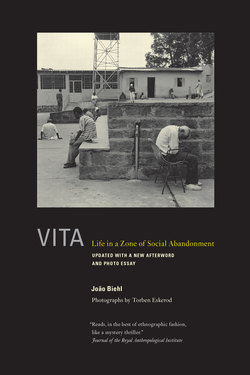Читать книгу Vita - João Biehl - Страница 18
На сайте Литреса книга снята с продажи.
Оглавление”Love is the illusion of the abandoned”
Crawling on the cement ground, a man was shouting: “O devil, eat shit! O devil, stick this bread in your ass!”
Most of the people in the infirmary sat quietly against a wall, absorbing the weak warmth of the winter sun on that late morning, August 5, 2000. Some moved around the body of the cursing man and, holding their sole possessions, wandered through the courtyard undisturbed. Inside of me, the man’s voice named the place: Inferno. He kept shouting the same thing.
Does he shout all day?
“It’s the spirit of the sufferers,” replied Catarina.
Do you believe in spirits?
“Yes,” she said, “in spirits, in a person passing desire to the other. . . . Like in the church, the priest transmits sexual tension.” Catarina added that she had been calm for the past three days, that her tooth was aching less, and that she had been writing “nonstop.” Her new volume began: “My dictionary, my name.”
On the next page, Catarina wrote: “Clóvis Gama, Catarina Gomes, Catarina Gama.”
She again told me that she and Clóvis, the nurse I had not yet met, were “together.” After Clóvis’s name, she first wrote her maiden name (her husband’s family name was Moraes) and then took up Clóvis’s last name, Gama—gamado means “very attracted to” and “sexually aggressive.” Catarina wrote the divorce into her name, I thought. She first identifies with the dead father’s name, as if she did not need to belong to another man, but then imagines that she belongs to the nurse who medicates her.
There was now an openness to her name as well. In the dictionary, the “R” in CATARINA was often replaced by an invented character similar to the letter “K” (which is not part of the Portuguese alphabet)—CATAKINA. She explained, “If I didn’t open the character, my head would explode.”
These names were followed by an accurate recollection of the Ten Commandments. Then, among a long list of diseases, she had written the statement “rheumatism in the nerves, in the muscles, in the flesh, in the blood” and a reference to “mal de parto” (a complication of childbirth) and “amnesia.” The next two pages were filled with references to money: “millions of cents, of reais, of dollars; Brazilian bank, credit union, savings account.” A long list of professions followed, beginning with “doctor and nurse.”
The next page, after references to religion, medicine, money, and the body, contained an acknowledgment of sexual enjoyment. She wrote of the discovery of love in sexual tension:
Sexual tension, pleasure, fuck
I discovered that I love you
In every kiss, in every hug
I feel that I want you ever more
In searching for love in the Other’s body, she is left with incompleteness and a surplus of desire.
In the next fragment, Catarina wants sperm and confounds the substance with the man:
I desire sperm
Viscous mucus
Now I know you
Love, sex, and the fantasy of both are not distinguishable in Catarina’s writing:
Love, fuck, masturbation
Making love with the fingers
Love among two is potency
For then man and woman
Don’t feel despised and abandoned
Without social ties, I thought, Catarina was left with sex as if it were love in Vita. Or perhaps she was knowingly writing that one is alone in love, in sex. One can also read this fragment as suggesting that a sexual relationship writes itself. The spirit of two lone sufferers and sexual tension meet in the discovery of love: an energy or potency, as she put it, to fight abandonment. “We don’t know what it means to be alive except for the following fact, that a body is something that enjoys itself” (Lacan 1998:23). In love, in sex, in writing, Catarina approached the reality of being a thing left to die:
To live masturbating and things
Things in life
To alleviate the penis
To be a thing of resurrection
How to be a thing of resurrection? Catarina knows the hatred of which the despised man is made and what he does to the Other as he eases the penis that he is.
Man without God, man without family. The despised man hurts.
Love for Catarina was a vital enjoyment. The dramatic effect of love, she wrote, was a point of suspension in her “nonexistence” in Vita, a path both out of and back into abandonment.
To feel love
Lonely love
To follow desire in lonesomeness
Love is the illusion of the abandoned
